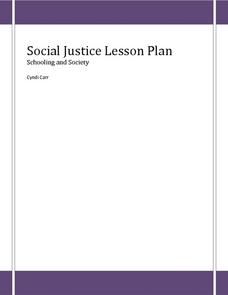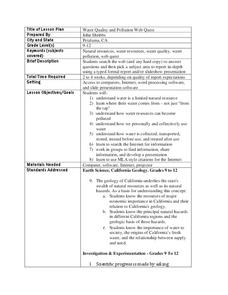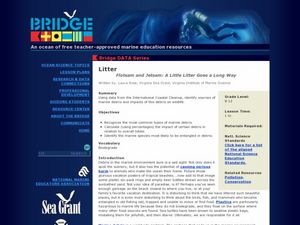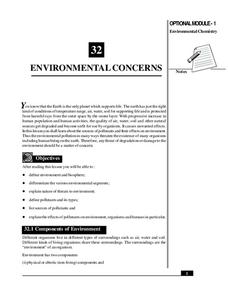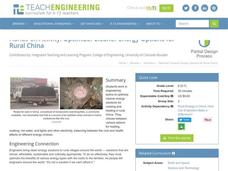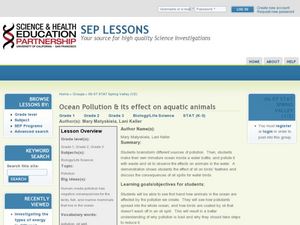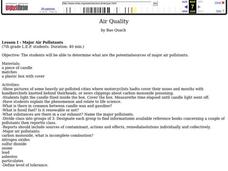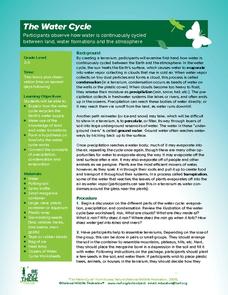Curated OER
Social Justice-Water in Developing Countries
Students explore how water shortage affects everyday life. In this social justice lesson, students discuss information about water shortage in Ghana. A water shortage simulation/game is played in which a "Canadian" team starts with a...
Curated OER
All Hands on Deck: A Harbor Education Program
Students build a model of an estuary. In this wetland lesson, students build a model estuary with a paint tray and modeling clay. They use the model to illustrate the impact of non-point pollution on the watershed.
Curated OER
Water Quality and Pollution Web Quest
Learners explore how water is a limited resource, where it comes from, how it can become polluted and how it is used. For this water quality instructional activity high schoolers search the web to answer given questions and prepare...
Curated OER
LitterFlotsam and Jetsam: A Little Litter Goes a Long Way
Students explore the concept of environmental stewardship. In this science lesson, students investigate data from the International Coastal Cleanup, identify sources of marine debris, and discover the impacts of this debris on wildlife.
Curated OER
Watershed Protection
Learners explore environmental care by participating in an Earth science activity. In this clean water instructional activity, students discuss what a watershed is, how they become polluted, and how it affects the overall quality of...
Curated OER
Snapshot Day Definitions and Activities
Here is a document full of teaching notes on water quality and bodies of water that you can use in your ecology curriculum. It has information specific to the Hudson River area, but can easily be adapted to any local body of water....
Curated OER
Water Pollution Graphing Activity
Students describe and identify the link between land use activities within a watershed and water quality. They evaluate the quality of a "water sample" ( a bag of skittles), graph their results, and form a hypothesis about the land use...
National Institute of Open Schooling
Environmental Concerns
Every year, more than 14 billion pounds of garbage is dumped into the oceans of the world, most of which is plastic and toxic to ocean life. Lesson 32 in the series of 36 focuses on environmental concerns, specifically pollution. Under...
Teach Engineering
Optimize! Cleaner Energy Options for Rural China
What are the trade-offs when looking to get the most benefit from an energy source? Small groups compare the cost-to-emission levels of several energy sources by looking at the information graphically. The groups utilize this...
Curated OER
Underground Pollution
Fourth graders construct their own aquifer. They discover how water travels underwater and identifies sources of underground pollution. They record their observations and discuss the results.
Curated OER
Non-Point Source Pollution
Students study non-point source pollution. They research the concept of bio-degradation and/or Nutrients/Fertilizers and discuss how non-point source pollution impacts the environment. Afterwards, they participate in an interactive...
Curated OER
Air Pollution: Visible and Invisible
Fourth graders work together to complete an experiment on air pollution. They identify visible and invisible forms of pollution. They gather their data in notebooks and analyze their results to end the lesson.
Curated OER
Ocean Pollution & its Effect on Aquatic Animals
Students consider the concept of ocean pollution. In this ocean lesson plan, students participate in a hands-on demonstration in order to replicate an oil spill and its effects on marine life.
Curated OER
Liquid Assets: Watershed
Middle schoolers watch videos and create a representation of their watershed. In this water resources and pollution lesson, students watch three short videos and discuss them. They use ordinary objects to create a model of their...
Curated OER
Is Our Water Clean?
Students identify qualities of clean water which will develop an awareness of people in the community who keep our water clean. This lesson has a literature tie-in with the "Magic School Bus" series.
Curated OER
Air Quality
Students determine potential sources of major air pollutants, explain how acid rain is generated and how it affects the environment, discuss global warming, and explore protective role of ozone and cause of ozone layer thinning. Lessons...
Curated OER
The Water Cycle
Students are introduced to the components and importance of the water cycle. They are shown how groundwater moves using a model. Students list 9 places on earth where water is found. They define the terms cycle and water cycle.
Curated OER
Where Do We Get Clean Water?
Students investigate the concept of a filter. They use simple supplies in order to construct one after watching a demonstration performed by the teacher. An important warning that the project water is not clean for drinking is included....
Curated OER
Water Resources and the Role of the Independent Sector
Young scholars identify the need to maintain and protect our natural resources. In this natural resource lesson, students study pictures of the effects of pollution on animals and water. Young scholars brainstorm a list of ways water is...
Curated OER
The Water Cycle
Students list the nine places on earth where water is found. They define the terms cycle and water cycle. Students explain how energy from the sun powers the movement of water molecules through the water cycle. They name and describe...
Curated OER
An Oil Spill Primer for Students
In this Gulf oil spill learning exercise, learners examine a 4-page article regarding basic facts about the oil spill as well as photographs of clean-up efforts.
Curated OER
Leach Out and Touch Someone
Students discuss how groundwater becomes polluted. In groups, they design and create models of groundwater pollution sources. They demonstrate to the class how the water may become contaminated from local and nonlocal pollution sources.
Carnegie Mellon University
Hydroelectricity
Use a simple PowerPoint presentation to introduce you environmental studies class to hydropower. Hold a debate about the pros and cons of developing this form of alternative energy. Power up your class with this simple lesson on a topic...
Curated OER
You Are What You Drink!
Young scholars explore water treatment systems. In this water conservation ecology lesson, students identify and explain several processes used for water treatment and define related vocabulary after listening to content information...


